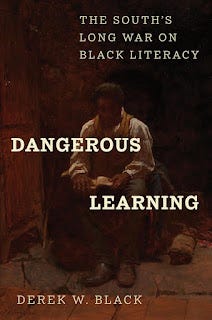Derek Black's new book Dangerous Learning: The South's Long War on Black Literacy is absolutely worth the read. I've talked about it at Forbes.com in my best fake journalist tones. But I want to go back to the book because A) I heard Black talk about it last weekend and B) this book is damned awesome and I can't say "damned awesome" at Forbes.com.
There many damned cool things about the book. First, there's a clearer picture of the story we all think we know. We tend to think that teaching enslaved persons to read and write was just always illegal and frowned on and that's it. But Black points out that, in fact, there was a point early on when lots of folks taught Blacks to read and write-- missionaries, some who held enslaved folks, etc.
Shutting down literacy was, as Black portrays it, a response to particular events, led by some extraordinary individuals. That starts with Denmark Vesey, who really deserves an entire book of his own, which should then be turned into a movie. Extraordinary man with an extraordinary life that leads him, eventually, to lead at slave revolt in Charleston. Except that the revolt doesn't quite some off. But the planned attempt gets peoples' attention. Then come David Walker and Nat Turner (all well before the Civil War) with increasingly scary slave revolts.
This is what kicks off a huge culture panic in the South. This weekend Black used the word "paranoia."
The revolt of enslaved persons is seen as a threat to the South's way of life. And at this point history starts to seem awfully damned familiar. It's not just that Blacks are forbidden to learn to read and write. Southern authorities start clamping down on any sort of avenue for subversive ideas. They try to get Northern states to clamp down on the folks printing subversive pamphlets. They start scrutinizing schools for teachers and textbooks for any hint of Forbidden Stuff, only instead of searching for CRT or gender ideology or divisive concepts that might be indoctrinating their children, they're looking for Northern Ideas. And they tried to guarantee that anything that slipped through would not be caught by enslaved persons. The lesson they took away was that a literate Black person was a dangerous one.
Like our current culture panic crowd, they are searching for something so vaguely defined that it covers a very broad area. But those Southerners achieve something that, so far, is only a dream for the modern culture panic crowd-- they managed to shut down all dissenting views. Black makes the argument that there was a variety of views about literacy and Northen Stuff in the South, but the culture panic shut all discussion down. And as Black said this weekend, once that dissent was silenced, an ugly outcome, even war, was inevitable.
This all illuminates why I stay away from the phrase "culture war." A war implies to combatants both charging the field to attack their enemies. But in the struggle for Black literacy (and I'd argue in our present-day attempts to shut down discussions of race and LGBTQ and Naughty Sex stuff), only one side is trying to attack the other. That other side is just trying to live their lives and make a better future for themselves. But for them to have that future is seen by the combative side as a threat to their way of life.
There's lots more to find in this book. The story of secret schools that managed to deliver education t0o Blacks even when it was illegal--and dangerous to be caught. Plus the always-depressing tale of how things unspooled under Reconstruction and Jim Crow.
It's a hell of a book. Black combines deep and thorough research with compelling narratives. I came away with more knowledge about things I hadn't known and a better perspective for things I had known. And the way that this earlier moment echoes our current one gives the book a sharp edge of relevance. If you have not already done so, grab a copy of this book.





It is incredibly disheartening to be shut down in discussions around the conflict of rights when males identify into female sports and win trophies, playing time, opportunities, and scholarships, taking these items from females. The same is not true of females identifying as males - they are not afforded the same privilege because their bodies are not male. It's Orwellian that suddenly something called "gender identity," a highly memed concept that comes out of postmodern Western academia, is to be regarded as more important than women's sex based rights. To speak out about it or to say "Women don't have penises" gets you labeled a "bigot" and a prompt cancellation.
If only we would pay attention to our "third gender" cultures that understand that gender roles are not sex and allow for a variety of gender presentations and societal roles without diminishing the role of women. No effeminate male regarded as Fafafine in Samoa, Muxe in Isthmus Zapotec in Oaxaca, or Lady boy in Thailand, would ever be allowed to undress in the female locker room, play against women in sports, or force everyone to regard them as actual females. Western colonialism has struck again - the male patriarchy has figured out a new way to force women to submit to coercion of language and lose hard fought sex based rights, because any man can today claim status as a woman for whatever reason and for whatever length of time.
At least we can count on the United Nations Special Rapporteur on Violence Against Women to see the consequences against women and girls in the field of athletics around the globe and how male participation, including trans identified males, hurts girls and women in this special report. https://docs.un.org/en/A/79/325 I hope that I will stop being shut down over understanding that women's rights are due to the differences in our biology, and that we must preserve them.